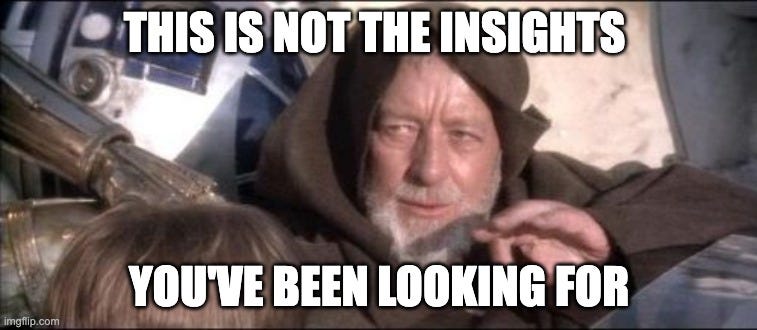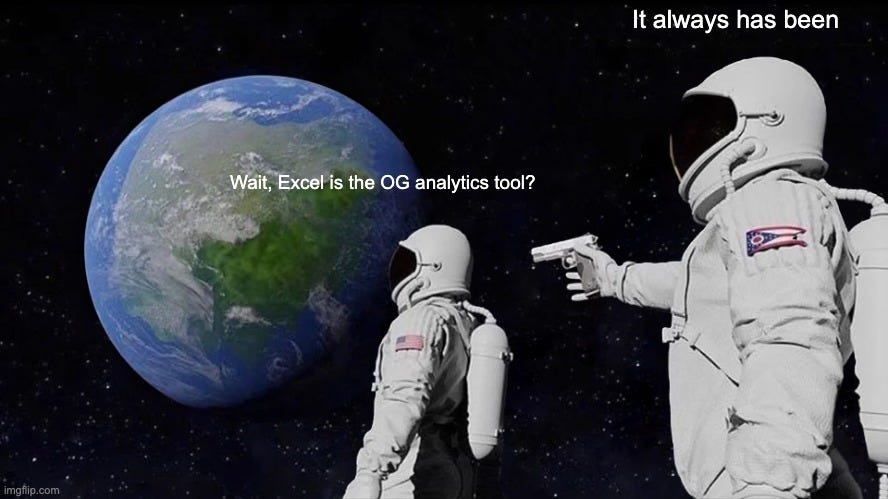From Excel Wizard to Dashboard Fighter. Journey of a Data Analyst
Covering the Data Analyst specialisations and differences between seniority levels.

This is one of a couple of posts about different data people specialisations, which later will explain how they all overlap or what’s needed to transition from one to another.
Introduction
Analysts nowadays are a crucial part of every organisation, whether they have an actual need or not. Everyone is chasing some magical insights and looking at how to be more data-driven (if possible). I’ve even written a blog post about the daily struggles of analysts that you can find here.
I’ve been in an analyst position and doing some dashboarding throughout my career, but it’s not my main area of expertise. All opinions are based on my exposure to different people at different companies.
This post will dissect different levels of analysts and talk about the various specialisations of a data analyst. Let’s first cover the different specialisations.
Specializations
Technical Data Analyst
Depending on their seniority, these folks know or are even fluent in Python/R/SQL. They know statistical concepts and how to apply them. In a way, you could call them Data Scientists, but they are still Data Analysts because they prefer to look for patterns, extract them and apply their extended knowledge for the benefit of their day-to-day. They might have picked up some of these skills while considering transitioning to the DS role or like to tinker with personal projects. From the data modelling side, they should be able to understand different modelling techniques and at least a basic understanding of ETL/ELT or whatever kids call these processes these days. Then there is A/B testing; this is where their experience with statistics shines. They can explain the details using their knowledge and push this methodology through the organisation if it’s not in place. Talking about dashboarding - I think they feel similarly like I do - I can, but I won’t if there is an option.
Business Data Analyst
You could call them the OG Data Analyst since other roles are split from this one. They understand business well, can interpret the data they see, and excel (pun inteded!) at communicating and presenting their findings. In difference to TDA mentioned above, their SQL and scripting skills could be better, similar to other more technical skills (data modelling, ETL/ELT). If we’re talking about dashboards, the OG version is used to do dashboards/graphs in Excel/PowerPoint. Still, nowadays, we can see them as basic to intermediate-level users of BI tools like Looker/Tableau/PowerBI, where you can leverage tons of drag-and-drop functionalities.
Data Visualization Specialist
Here are the UX/UI experts. They’re magicians when it comes to showing insights neatly and understandably. They know dashboarding tools like the back of their hands, and storytelling with them is where they excel (pun intended!). In some cases, they’re doing some programming with Python dashboarding libraries or the famous D3.js. You might wonder why they can create such beautiful dashboards - but it’s a hard-earned skill to interpret data and understand the narrative of what this data will be used for.
Seniority levels
I won’t go into specifics of technicalities; more or less, technical skill levels go hand in hand with seniority, and it highly depends on the company’s needs or the stack they have. You can be a fantastic data analyst with only Excel being your magical sword, or you can be an SQL magician if that’s the preferred way in the company.
The key thing is deep business knowledge. Also, no matter what the seniority level, the person should have high levels of communication (verbal and written) and proactivity (TBH, usually not mandatory, and people tend to be lazy; if you want to progress in your career faster, a couple of extra steps will give you an advantage). Remember that you should treat everything as a project and sometimes even a product. Managing your time and priorities efficiently is also a must here, so you’re also PO/PM.
Junior
Usually, it’s a person starting in the data field or having experience as an intern. Naturally, because of this, tasks will be very low-level. This will allow him or her to familiarize himself/herself with the role and responsibilities. The person should be able to plan his work for a few weeks and give proper estimations based on his knowledge. Usually, there is a lot of guidance and help in his day-to-day, just because of lack of experience and/or knowledge.
Uncle Data is teaming up with Turing College! They say they’re the #1 place to learn online for working professionals. Check out their Data Analytics or Data Science and Analytics Masters Degree programs to enter the Data Field or brush up your skills!
While Turing College will provide you with the necessary skills, Uncle Data will help you navigate the caveats of the industry and things that are not visible straight from the trenches.
Mid
At this point, tasks will get less clear, leaving some room for communications with stakeholders to figure out details (or ask your lead questions to figure out what’s missing). Understanding capabilities means that the person should be able to focus on longer terms. Still, the analytics world is fast-paced, so I can honestly say this part is irrelevant, no matter how good you’re at planning, you’ll throw it out the window in a week. It’s not only because of data being fast-paced, but you have to react to business changes too! Referring to my article on struggles, for sure, you’ll be dealing with fires here and there and plugging holes.
You’ve reached the next trust level by showing a track record as a junior; now, you could be exposed to broader scope analysis and a push to deliver more. More money, more responsibilities. At this point, you should have some basic understanding of what tasks you should say “No” and be able to discuss potential shifts in priorities (this also depends on lead’s role, if he’s more just aligning things and less into tech deliveries, you might suggest some quicker wins). If you see something differently - always talk about it with your lead! You might be missing some context or have some insight from your experience that might make some adjustments.
Senior
Hello, you’ve entered a zone of minimal to zero support. Take this extinguisher and fight fires, and here is this magical sword of data insights, fight Dragons of Stakeholderia. Jokes aside, now you’re involved in many activities; you can take almost any task head-on and deliver it end to end (and maybe lead some projects too!). Usually, comers or even juniors are given as mentees to Seniors to onboard and help them get started. You can clarify scopes and unclear tasks at ease, oversee the involvement of the data engineering team (or mediate for their more extensive participation), and deliver presentations to stakeholders of insights and suggestions you’ve found.
A crucial skill here is constantly looking for ways to improve and minimise manual work where possible. Less manual work on things that can be automated, more time for probing problematic areas, and even suggesting some business changes if they can be seen from the data. You are now more of a business partner; your role is to help them succeed as much as possible. This leads to your understanding of not only the analytics scope but also how engineering and other parts of the company operate and interact together.
Team Lead
Welcome to the level where you will try to juggle a people manager role and deliver some IC work. So, you have the same responsibilities and expectations as a Senior + people management of your team. Usually, it’s best to have a small start of 1-3 people. Otherwise, you’ll burn out, or you won’t be able to handle the trade-off between time spent on people vs. delivering actual work. People management is real work, usually in the form of meetings. Believe me, it’s way different than you thought of and what you were used to doing as a Senior.
Later, you’ll get used to it and realise that the team is the most significant asset. Helping them grow and letting them achieve not only company but their personal goals will make you a successful lead/manager. At least for me, a manager was more associated with negativity and being bossy, but their meaning and role are the same! You can read my post on Team Lead or Manager from some time ago here.
Staff Analyst
I’ve only seen a similar title once: Principal Analyst. In this context, it looks the same as the next IC level, so let’s not go into semantics here. The catch here is that you’re supposed to be looking out not only for one part of the company but on a higher level, usually involving a couple of them. You should be more of a guiding person and a mentor to other ICs on a more technical level. Your job is to streamline approaches, maybe push for templating or standards for all other analysts to use and apply as a rule.
Summary
Now, when looking at what I’ve written for different seniority levels, it’s pretty visible that the higher you go as an Individual Contributor, the more things you have to know, be aware and push for. To be a successful IC, you must understand that with each next step, you’ll have more responsibilities. Before you leap (in the same company or apply in another), always try to fit the shoes if all parts feel OK. You might notice that some of your areas are stronger, some weaker, though if you’re feeling 80% ready - go for it. The Golden Pareto rule does the trick as well. This will also keep the imposter syndrome at bay.








